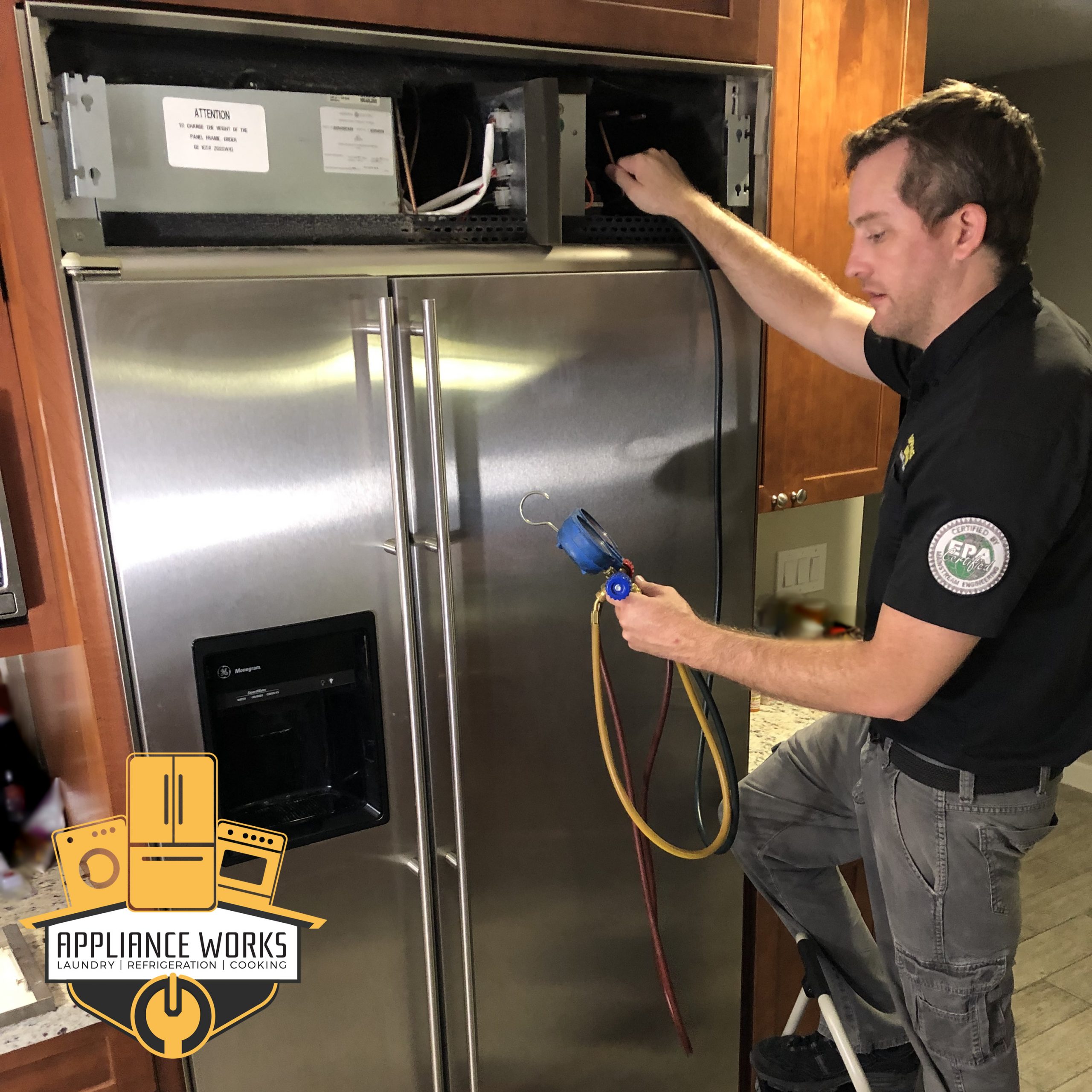Vital Tips for Effective Ref Fixing to Extend Home Appliance Life Expectancy
When it comes to your refrigerator, appropriate repair service and upkeep are vital for durability. You may not understand how small problems can intensify if they're left unaddressed. Normal check-ups and easy repairs can conserve you from pricey substitutes down the line. Understanding common problems and understanding when to act can make all the difference. Allow's discover some crucial tips that will help you keep your refrigerator running efficiently for years to come.
Recognizing Typical Fridge Problems
Fridges are crucial in maintaining your food fresh, however they can experience a range of typical problems that disrupt their efficiency. One constant concern is poor air conditioning. If you see food ruining quicker than common, inspect the thermostat settings or think about if the door seals are damaged. Another usual issue is extreme noise, which can show a malfunctioning compressor or a stopping working fan. You might also experience water merging inside or beneath the fridge; this typically results from a clogged defrost drainpipe or a damaged water line. Furthermore, if your fridge's light isn't working, maybe a simple light bulb problem or an issue with the door switch. Ice accumulation in the freezer can impede air flow and cooling efficiency. Identifying these problems early can conserve you time and money out of commission, guaranteeing your fridge runs efficiently and efficiently.
Normal Upkeep Practices
To maintain your devices running smoothly, you need to remain on top of regular maintenance techniques. Tidy the condenser coils, check the door seals, and check the temperature settings to ensure peak efficiency. These simple tasks can save you money and time on repairs down the line.
Clean Condenser Coils Regularly
Cleaning your condenser coils on a regular basis can greatly enhance your home appliance's performance. Dirt and dust develop on these coils in time, triggering your device to function harder and consume more energy. To keep them clean, unplug your home appliance and meticulously get rid of any protective covers. Use a vacuum with a brush attachment or a soft brush to gently remove debris. If needed, a mix of warm water and mild detergent can aid remove stubborn crud. See to it to allow everything completely dry completely before rebuilding and connecting the home appliance back in. Aim to cleanse your coils a minimum of twice a year, or more frequently if you have pets or live in a messy atmosphere. This straightforward task can expand the lifespan of your device considerably.
Inspect Door Seals
Three straightforward actions can help you assure your home appliance's door seals are in good problem. Check the seals consistently for any fractures, splits, or indicators of wear. These problems can lead to air leaks, impacting effectiveness. 2nd, tidy the seals using warm, soapy water to get rid of any kind of debris or grime. A tidy seal guarantees a limited fit and better efficiency. Ultimately, carry out a simple examination by closing the door on a notepad. If you can quickly draw it out without resistance, the seal could need changing. By complying with these steps, you'll preserve your appliance's performance and long life, conserving you cash on energy bills and repair work over time.
Display Temperature Level Setups
Frequently monitoring your home appliance's temperature level settings is necessary for ideal efficiency and performance. Whether you're managing a fridge, fridge freezer, or stove, watching on these setups can avoid numerous issues. For refrigerators, goal for temperature levels between 35 ° F and 38 ° F; for freezers, stay 0 ° F. If the temperature levels are expensive or low, your home appliance may work harder, wasting energy and shortening its life-span. Utilize a thermostat to examine these setups frequently, specifically after major adjustments, like relocating your device or readjusting the thermostat. If you notice changes, adjust the settings as necessary and consult the customer manual for support. By staying aggressive regarding temperature level monitoring, you'll assure your devices run smoothly and last longer.
Repairing Cooling Issues
When your fridge isn't cooling correctly, it can bring about ruined food and wasted money, so addressing the issue quickly is vital. Beginning by checking the temperature setups to confirm they go to the advised degrees, typically around 37 ° F for the refrigerator and 0 ° F for the fridge freezer. If the setups are right, check the door seals for any type of spaces or damage; a defective seal can enable warm air to get in.
Examine the condenser coils, generally situated at the back or bottom of the unit. Tidy them with a vacuum or brush to optimize efficiency. If issues persist, it might be time to call a specialist.
Dealing With Water Leak and Ice Build-Up
If you're handling water leakage or ice accumulation in your device, it's crucial to recognize the source of the trouble. By identifying where the water is coming from, you can protect against more problems and avoid costly repairs. Let's explore some reliable methods to tackle these usual issues.
Determine Leak Sources
How can you successfully determine the sources of water leak and ice accumulation in your home appliances? Begin by evaluating the seals and gaskets on your refrigerator and freezer doors. By systematically checking these areas, you'll identify the source of the issue, enabling you to take the needed actions to repair it and expand your device's lifespan.
Avoid Ice Development
To stop ice formation in your home appliances, begin by validating the temperature settings are proper. If your refrigerator or freezer is too cold, it can result in excessive ice article source build-up. Examine the door seals regularly; harmed seals can allow warm air in, triggering condensation and ice development.
Maintain the home appliance well-ventilated and avoid overcrowding, as this can block air movement - Who Repairs Dryers in Oro Valley? Dependable Refrigeration & Appliance Repair Service. Also, consistently defrost your freezer if it does not have an automatic defrost attribute.
If you notice water leak, determine and repair any kind of obstructed drainage openings, as they can add to ice buildup. Ultimately, tidy the coils and confirm they're functioning correctly to keep peak performance. Taking these steps will certainly aid extend your device's life-span and effectiveness.
Dealing With Noisy Fridge Sounds
While it may appear worrying, a loud fridge commonly indicates small issues instead of significant malfunctions. Determine the resource go to my blog of the sound. Common perpetrators consist of the compressor, fans, and water lines. If you hear a humming audio, it might be the compressor working hard; this could just be a typical procedure audio.
Next, check for loose products inside. Occasionally, containers or shelves can rattle, producing undesirable sound. Tighten or reposition them to get rid of the audios.
If you discover a clicking sound, it could be the defrost timer. This is typically harmless yet could suggest it needs evaluation.
Lastly, confirm your fridge is degree. An out of balance home appliance can produce vibrations and noise. Utilize a degree to inspect, and change the feet if required. Resolving these concerns promptly can aid keep your fridge's efficiency and extend its life expectancy.
When to Replace Parts vs. Complete Replacement

Take into consideration the cost of repairs versus the appliance's value. Additionally, if you discover continuous issues that keep persisting, it's an indication that your home appliance has actually reached the end of its life.
Understanding When to Call an Expert
Exactly how can you tell when it's time to employ a specialist for device fixing? If you observe uncommon sounds, scents, or leaks, it's a clear signal that something's wrong. Don't ignore these indicators; they often show much deeper problems. If your home appliance quits working altogether or often trips circuit breakers, it's an additional red flag.
You ought to likewise consider your very own convenience level with repair work. If you're uncertain about identifying Get More Information the issue or lack the right devices, it's finest to reach out for aid. Keep in mind, trying challenging repairs can lead to even more damages or perhaps safety threats.

Often Asked Inquiries
How Usually Should I Clean the Fridge Coils?
You should clean your refrigerator coils every 6 months. This helps preserve performance and stops overheating. If you observe too much dust or animal hair, tidy them much more frequently to ensure your refrigerator runs efficiently.

Can I Use Vinegar for Cleaning My Fridge?
Yes, you can utilize vinegar to cleanse your fridge! It's an excellent natural cleanser that eliminates odors and stains. Best Appliance Repair Near You Dependable Refrigeration & Appliance Repair Service. Just mix it with water, use it to surfaces, and wipe down for a fresh, clean fridge
What Temperature level Should My Fridge Be Ready To?
You should set your refrigerator to 37 ° F(3 ° C) for perfect food preservation. This temperature level maintains your food fresh while stopping wasting, guaranteeing your groceries last much longer and reducing waste. It's an easy modification you can make!
Does a Fridge Required to Be Leveled?
Yes, your refrigerator requires to be leveled. If it's unequal, it can impact cooling performance and create excess sound. Inspect the leveling legs and readjust them to guarantee proper equilibrium for excellent efficiency.
Exactly How Can I Reduce Refrigerator Power Usage?
To decrease your refrigerator's power usage, keep it tidy and well-ventilated, inspect door seals for leaks, set the temperature level between 35-38 ° F, and avoid overloading it. These actions can substantially lower your power expenses.